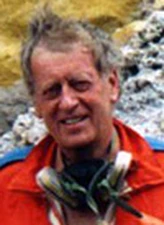Terry M. Seward

The 2005 Robert Wilhelm Bunsen Medal is awarded to Terry M. Seward for his pioneering contributions in hydrothermal geochemistry, particularly the development and application of in situ techniques to determine compositions and structures of hydrothermal solutions.
Terry Maxwell Seward, who was born in 1940 in Canada, citizen of Canada and New Zealand, is currently Professor of Experimental Geochemistry at the Department of Earth Sciences at ETH Zurich, Switzerland. Terry Seward who received his undergraduate education in Canada and obtained his PhD degree (1969) from Manchester, UK is an outstanding scientist who did not only pioneer the field of experimental geochemistry, but less well known, is also an expert mineralogist.
Terry Seward carrier is basically split in two periods:
1970-1989 Terry Seward was the driving force in building up an experimental (and analytical) geochemistry facility at the Chemistry Division of DSIR in Auckland, New Zealand that he headed as group leader from 1980-1989. The principal research was devoted to the geochemistry and thermodynamics of hydrothermal fluids. Terry Seward made and makes basic, fundamental contributions in the field of hydrothermal fluid geochemistry. Due to contributions from Terry and his co-workers quantitative assessment of the formation of ore deposits related to hydrothermal processes became possible. Ongoing experimental research focuses on solubility mechanisms and speciation of cations and anions in sulfur, chlorine, fluorine, etc bearing hydrous and CO2-rich fluids and brines at elevated to high pressures and temperatures.
In 1989 Terry Seward accepted a chair at the Department of Earth Sciences at ETH Zurich were he constructed a new laboratory allowing him to continue and expand his previous research. However, Terry Seward moved also in new areas related to high-temperature geochemistry including recently finished or ongoing, successful research projects on (1) the stability of organic compounds under hydrothermal conditions providing insight into synthesis and stability of bio-molecules in seafloor hydrothermal systems thought to be crucial for the origin of life on our planet, (2) the compositions, including isotope geochemistry, of volcanic, fumarolic gases in order to study shallow level hydrothermal processes and to provide and improve geochemical tools for volcanic hazard assessment, or (3) the development of new experimental techniques to measure speciation and solubility of various cations/anions under high-P-T conditions by in-situ spectroscopic and diffraction techniques using conventional analytical equipment as well as high-energy synchrotron radiation sources. Terry, however, does not confine himself to experimental and analytical research; his group at ETH Zurich produces frontier contributions in geochemical modeling predicting stabilities, structures and thermodynamic properties of solid-fluid systems at elevated pressure-temperature conditions.
Terry Seward serves the scientific and academic community in various positions. He was or is editor of several international journals including Geochimica et Cosmochimica Acta; member, chairman or president of national and European societies, (co-)organizer of several Goldschmidt and other meetings, workshops, sessions including former EUG and EGU meetings; he served as chairman of the Department of Earth Sciences at ETH Zurich. Terry is a fine colleague and who knows Terry personally particularly appreciates his very fine humor.
Terry Seward is an expert mineralogist and in possession of a large collection of spectacular and rare minerals. He is particularly recognized for his expertise in volcanic exhalation/condensation products/minerals that are also related to his research on volcanic gases. In 2002, a new mineral, a CaFe-arsenite was named after Terry Seward (sewardite) in recognition of his important contribution in the field of mineralogy.
In summary, Terry M. Seward is a very versatile earth scientist who made profound, outstanding and fundamental contributions leading to breakthroughs in various fields of earth sciences with emphasis in high-temperature geochemistry. I highly recommend Terry Seward to become the first awardee of the new medal of the VGPM division of EGU.
